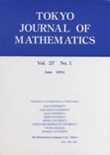
Tokyo Journal of Mathematics
Scope & Guideline
Cultivating Excellence in Mathematical Research
Introduction
Aims and Scopes
- Algebra and Number Theory:
The journal frequently publishes papers exploring topics in algebraic structures, number theory, and their applications, including class groups, modular forms, and algebraic independence. - Geometry and Topology:
A significant focus is placed on geometric and topological studies, including manifold theory, knot theory, and homology, contributing to both theoretical advancements and practical applications. - Analysis and Partial Differential Equations:
Research in functional analysis, Sobolev spaces, and partial differential equations is prevalent, with papers addressing both foundational aspects and complex problem-solving techniques. - Representation Theory:
The journal includes works on representation theory, particularly regarding algebraic groups and their representations, fostering a deeper understanding of symmetries in mathematics. - Mathematical Methods and Algorithms:
There is a consistent emphasis on the development of new mathematical methods and algorithms, especially in the context of continued fractions, approximation theory, and computational mathematics.
Trending and Emerging
- Advanced Algebraic Structures:
There is a growing interest in advanced topics within algebra, including modular Galois representations and their connections to number fields, highlighting their importance in modern research. - Geometry of Manifolds and Algebraic Geometry:
The exploration of geometric properties of manifolds and connections to algebraic geometry is on the rise, indicating a trend towards interdisciplinary approaches that blend these fields. - Elliptic Equations and Their Applications:
Research on elliptic equations, particularly semilinear and nonlinear types, has gained traction, reflecting their relevance in both pure and applied mathematics. - Continued Fractions and Number Theory:
The study of continued fractions has emerged as a significant theme, showcasing their applications in number theory and algorithmic processes. - Homological and Topological Methods:
Emerging focus on homology theories and their applications in topology suggests a revitalization of interest in these fundamental areas of mathematics, driving new discoveries.
Declining or Waning
- Classical Analysis and Number Theory:
Papers focused on classical analysis and traditional number theory topics have decreased, possibly due to a shift towards more modern and applied approaches in these fields. - Elementary Geometry:
Research articles specifically centered on elementary geometric concepts appear to be waning, as more complex and abstract geometric theories gain prominence. - Historical Mathematical Methods:
The exploration of historical mathematical methods and their applications is less frequent, indicating a trend towards novel approaches rather than revisiting classical techniques. - Discrete Mathematics:
There has been a noticeable reduction in papers addressing discrete mathematics, suggesting a possible transition towards continuous mathematics and its applications. - Statistical Methods in Mathematics:
The integration of statistical methods within purely mathematical frameworks is less common, potentially reflecting a specialization in applied statistics in separate domains.
Similar Journals

Acta Mathematica Vietnamica
Cultivating a Global Dialogue on Mathematical ExcellenceActa Mathematica Vietnamica is a reputable journal in the field of mathematics, published by Springer Singapore Pte Ltd. With an ISSN of 0251-4184 and an E-ISSN of 2315-4144, this journal has been a significant platform for disseminating research findings and advancements in mathematical theories and applications since its inception. It currently holds a Q3 ranking in Mathematics (miscellaneous) for the year 2023, reflecting its growing influence within the academic community. Despite being based in Singapore, Acta Mathematica Vietnamica resonates globally, attracting contributions from researchers and professionals worldwide. While the journal operates under a subscription model, it offers robust access options, ensuring that critical research is accessible to a diverse audience. Researchers and students will find invaluable insights within its pages, facilitating a deeper understanding and exploration of advanced mathematical concepts. As it continues to converge from 2011 to 2024, this journal remains dedicated to fostering innovation and collaboration in the mathematical sciences.

Forum of Mathematics Sigma
Fostering collaboration in the world of mathematics.Forum of Mathematics Sigma is a premier open access journal published by Cambridge University Press that has been at the forefront of mathematical research since its inception in 2013. With a strong emphasis on advancing the fields of mathematics, the journal consistently achieves Q1 rankings across multiple categories, including Algebra and Number Theory, Analysis, and Computational Mathematics. This distinction highlights its impact and relevance within the scholarly community. The journal prides itself on providing a platform for innovative research, fostering collaboration among researchers and practitioners across various mathematical disciplines. Open access publication ensures that cutting-edge findings are widely available to readers globally, enhancing the dissemination of knowledge. With an address in the heart of Cambridge, England, Forum of Mathematics Sigma is dedicated to promoting high-quality research and making significant contributions to the development of mathematics.
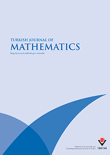
Turkish Journal of Mathematics
Fostering Excellence in Diverse Mathematical DisciplinesTurkish Journal of Mathematics is a prestigious academic publication dedicated to the advancement of mathematical research across a variety of subfields. Established in 1995 and published by the Tubitak Scientific & Technological Research Council Turkey, this journal has built a solid reputation, especially noted for its significant contributions to the field over the years, with its convergence spanning from 1995 to 2002 and again from 2006 to 2024. The journal, which holds a commendable Q2 ranking in Mathematics (miscellaneous) and is positioned in the 66th percentile of Scopus rankings for General Mathematics, aims to disseminate high-quality original research, reviews, and innovative methodologies to advance both theoretical and applied mathematics. Researchers, professionals, and students alike will find invaluable resources within its pages, providing insights that are pivotal for academic and practical applications in mathematics. Although it does not currently offer open access options, the journal remains an essential platform for those looking to engage with the forefront of mathematical inquiry.

Periodica Mathematica Hungarica
Advancing Mathematical Frontiers, One Study at a Time.Periodica Mathematica Hungarica is a prestigious academic journal published by Springer, focusing on the field of mathematics, with a particular emphasis on miscellaneous mathematical studies. Established in 1971, this journal has maintained its commitment to advancing mathematical research and its applications, making significant contributions over its converged years through 2024. With a Q2 ranking in the mathematics category as of 2023, it establishes itself as a vital resource within the mathematical community. Researchers and academics will find its inclusion in the Scopus database, ranking #189 out of 399 in general mathematics, indicative of its impact and relevance. Although it does not feature open access, the journal provides a wealth of high-quality peer-reviewed articles, thereby serving as an essential platform for the dissemination of innovative mathematical theories, methodologies, and findings. Engaging with the content of Periodica Mathematica Hungarica is crucial for anyone looking to stay at the forefront of mathematical research and development.

TRANSACTIONS OF THE AMERICAN MATHEMATICAL SOCIETY
Connecting Scholars Through Rigorous Mathematical InquiryTRANSACTIONS OF THE AMERICAN MATHEMATICAL SOCIETY, published by the American Mathematical Society, is a premier journal in the field of mathematics that has been contributing to the advancement of mathematical knowledge since 1900. With an ISSN of 0002-9947 and an E-ISSN of 1088-6850, this journal holds a prestigious position in the academic landscape, evidenced by its Q1 rankings in both Applied Mathematics and Miscellaneous Mathematics categories as of 2023. With a Scopus ranking of #97 in General Mathematics and a percentile standing of 75th, the journal is recognized for its rigorous peer-review process and the quality of the research it publishes. Though it does not currently offer open access options, it essentially serves as a vital resource for researchers, professionals, and students seeking critical insights and developments in mathematical theory and applications. The Transactions aim to publish high-quality research articles that foster the exchange and dissemination of ideas, supporting the growth of both theoretical and applied mathematics within the global scholarly community.

Ukrainian Mathematical Journal
Pioneering Insights in MathematicsThe Ukrainian Mathematical Journal is a prominent academic publication in the field of mathematics, focusing on a diverse range of topics that appeal to researchers, professionals, and students alike. Published by Springer, this journal has been an important platform for disseminating significant mathematical research since its inception in 1957. With the aim of fostering knowledge and collaboration within the mathematical community, the journal curates high-quality articles that meet rigorous scholarly standards, evidenced by its Q3 ranking in the miscellaneous mathematics category for 2023. Although it currently does not offer open access, the journal remains accessible through various institutional subscriptions. It serves as a vital resource for ongoing discourse in the field and invites contributions that further advance mathematical understanding.
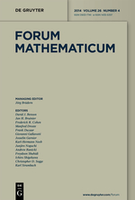
FORUM MATHEMATICUM
Exploring the Depths of Mathematical InnovationFORUM MATHEMATICUM, published by WALTER DE GRUYTER GMBH, is a distinguished academic journal based in Germany, known for its significant contributions to the field of mathematics. With an ISSN of 0933-7741 and an E-ISSN of 1435-5337, the journal features comprehensive studies ranging from applied mathematics to diverse mathematical disciplines. Having maintained a commendable presence since 1989, FORUM MATHEMATICUM has achieved notable classification rankings, including Q2 in Applied Mathematics and Q1 in miscellaneous Mathematics as of 2023. Additionally, it holds a Scopus rank within the top 60th percentile in General Mathematics, making it a prominent platform for researchers and professionals seeking rigorous analysis and innovative methodologies in mathematics. While the journal does not currently offer open access, its rich content is pivotal for advancing mathematical theory and applications, appealing to students and seasoned academics alike.
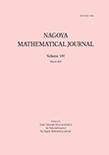
NAGOYA MATHEMATICAL JOURNAL
Shaping the Future of Mathematics with High-Impact ResearchNAGOA MATHEMATICAL JOURNAL, published by Cambridge University Press, is a prestigious journal that has been at the forefront of advancing mathematical scholarship since its inception in 1950. With an ISSN of 0027-7630 and an E-ISSN of 2152-6842, this journal has gained recognition for its high-quality research contributions in the field of mathematics, achieving a Q1 classification in Mathematics (miscellaneous) as of 2023. The journal’s impact is further reflected in its Scopus rank of #164 out of 399 in the General Mathematics category, positioning it within the 59th percentile of its peers. Scholars, researchers, and students can access a range of innovative mathematical studies that explore diverse topics, fostering a vibrant dialogue within the mathematical community. By catering to a global audience, the NAGOYA MATHEMATICAL JOURNAL continues to play a critical role in shaping contemporary mathematical discourse and research.

PUBLICATIONES MATHEMATICAE DEBRECEN
Connecting Scholars through High-Quality Mathematical ResearchPublicationes Mathematicae Debrecen is a renowned international journal published by the University of Debrecen, Institute of Mathematics, situated in Hungary. This journal, with both ISSN 0033-3883 and E-ISSN 2064-2849, has established itself in the field of mathematics since its inception, with coverage extending from 1997 to 2024. Recognized for its rigorous academic standards, it currently holds a Q3 ranking in the mathematics (miscellaneous) category for 2023 and ranks at the 42nd percentile among general mathematics journals in Scopus. Publicationes Mathematicae Debrecen aims to disseminate high-quality research across various areas of mathematics, contributing to the advancement of knowledge and practice in this dynamic field. Although it is not an open-access journal, its readers can access a wealth of scholarly work that addresses both theoretical and applied mathematical issues, making it an invaluable resource for researchers, professionals, and students alike.
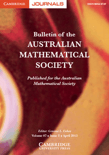
BULLETIN OF THE AUSTRALIAN MATHEMATICAL SOCIETY
Championing Original Research and Comprehensive ReviewsBULLETIN OF THE AUSTRALIAN MATHEMATICAL SOCIETY is an esteemed journal dedicated to advancing the field of mathematics, published by Cambridge University Press. Since its inception in 1969, this periodical has fostered scholarly communication and showcased pivotal research in various domains of mathematics, now projected to continue until 2024. With an impact factor that places it in the Q2 category of miscellaneous mathematics research, it holds a notable position among its peers, ranking 215th out of 399 in the Scopus database. Though it does not currently offer open access options, the journal remains a vital resource for researchers, professionals, and students seeking to deepen their understanding of mathematical advancements. The Bulletin serves as a crucial platform for disseminating original research, comprehensive reviews, and insightful perspectives that navigate the complexities of mathematics today, ensuring the community is well-informed and engaged.